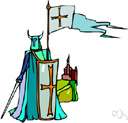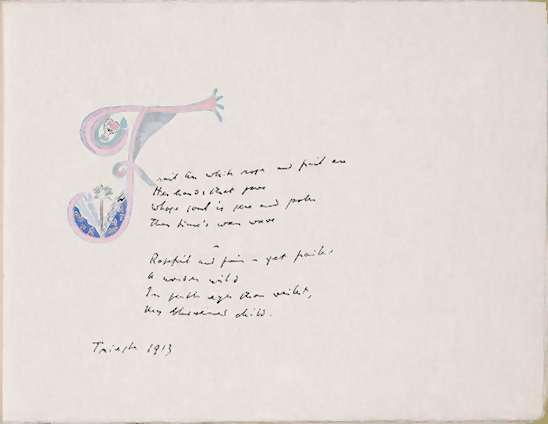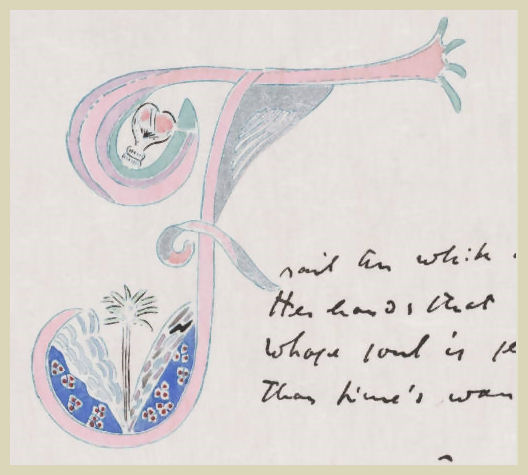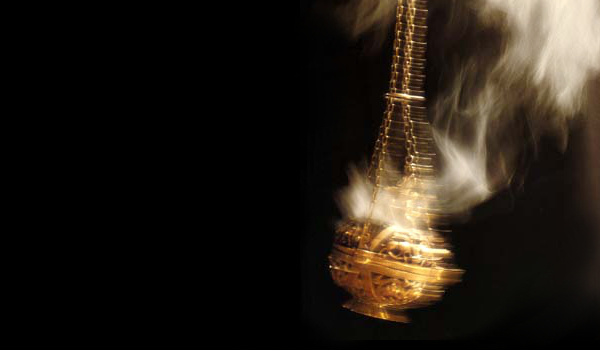Saturday, April 30, 2016
Thursday, March 31, 2016
Pomes Penyeach
[pdf]
Tilly Watching the Needleboats at San Sabba A Flower Given to My Daughter She Weeps over Rahoon Tutto è sciolto On the Beach at Fontana Simples Flood Nightpiece Alone A Memory of the Players in a Mirror at Midnight Bahnhofstrasse A Prayer
Tilly (Dublin, 1904, originally known as "Cabra")
Watching the Needleboats at San Sabba (Trieste, 1912)
A Flower Given to My Daughter (Trieste, 1913)
She Weeps over Rahoon (Trieste, 1913)
Tutto è sciolto (Trieste, 13 July 1914)
On the Beach at Fontana (Trieste, 1914)
Simples (Trieste, 1914)
Flood (Trieste, 1915)
Nightpiece (Trieste, 22 January 1915)
Alone (Zurich,1916)
A Memory of the Players in a Mirror at Midnight (Zurich, 1917)
Bahnhofstrasse (Zurich, 1918)
A Prayer (Paris 1924)
Tuesday, March 29, 2016
Tilly
Tilly
(Dublin, 1904, originally known as "Cabra")
He travels after a winter sun,
Urging the cattle along a cold red road,
Calling to them, a voice they know,
He drives his beasts above Cabra.
The voice tells them home is warm.
They moo and make brute music with their hoofs.
He drives them with a flowering branch before him,
Smoke pluming their foreheads.
Boor, bond of the herd,
Tonight stretch full by the fire!
I bleed by the black stream
For my torn bough!
Sunday, March 27, 2016
Watching the Needleboats at San Sabba
Watching the Needleboats at San Sabba
(Trieste, 1912?) [1913]
I heard their young hearts crying
Loveward above the glancing oar
And heard the prairie grasses sighing:
No more, return no more!
O hearts, O sighing grasses,
Vainly your loveblown bannerets mourn!
No more will the wild wind that passes
Return, no more return.
Friday, March 25, 2016
A Flower Given to My Daughter
A Flower Given to My Daughter
(Trieste, 1913)
when Lucia was six
Frail the white rose and frail are
Her hands that gave
Whose soul is sere and paler
Than time's wan wave.
Rosefrail and fair — yet frailest
A wonder wild
In gentle eyes thou veilest,
My blueveined child.
Wednesday, March 23, 2016
She Weeps over Rahoon
She Weeps over Rahoon
(Trieste, 1913)
Rain on Rahoon falls softly, softly falling,
Where my dark lover lies.
| Rahoon Cemetery |
Sad is his voice that calls me, sadly calling,
At grey moonrise.
Love, hear thou
How soft, how sad his voice is ever calling,
Ever unanswered, and the dark rain falling,
Then as now.
Dark too our hearts, O love, shall lie and cold
As his sad heart has lain
Under the moongrey nettles, the black mould
And muttering rain.
fdv:
TYP 1915 (Cornell 54), lines 1-8
|
MS 1919 (Huntington E.6.b), lines 1-8
| |
1
|
Rain on Rahoon falls softly, softly falling,
|
Rain on Rahoon falls softly, softly falling,
|
2
|
Where my dark lover lies
|
Sad is his voice that calls me, sadly calling,
|
3
|
Soft is the voice that calls me, softly calling,
|
Where my dark lover lies.
|
4
|
At grey moonrise
|
At grey moonrise.
|
5
|
Love, hear thou
|
Love, hear thou
|
6
|
How sad, how old the heart is, ever calling,
|
How soft, how sad his voice is ever calling,
|
7
|
Ever unanswered – and the dark rain falling,
|
Ever unanswered, and the dark rain falling,
|
8
|
Then as now.-
|
Then as now.
|
[...]
|
[...]
|
Monday, March 21, 2016
Tutto è sciolto
Tutto è sciolto
(Trieste, 13 July 1914)
The title, "Tutto è Sciolto", can be translated as "All is lost now", and is a quotation from the opera The Sleepwalker (La Sonnambula) by Vincenzo Bellini. (literally: Everything is melted)
A birdless heaven, seadusk, one lone star
Piercing the west,
And thou, fond heart, love's time, so faint, so far,
Rememberest.
Her clear young eyes' soft look, the candid brow,
The fragrant hair,
Falling as through the silence falleth now
Dusk of the air.
Why then, remembering those shy
Sweet lures, repine
When the dear love she yielded with a sigh
Was all but thine?
fdv:
TYP 1915 (Cornell 54)
|
MS 1927 (Huntington E.6.b)
| |
Tutto è Sciolto
|
Tutto è Sciolto
| |
1
|
A birdles heaven, seadusk and a star
|
A birdless heaven, seadusk, one lone star
|
2
|
In the dim west–
|
Piercing the west,
|
3
|
And thou, poor heart, love's image, faint and far
|
As thou, fond heart, love's time, so faint, so far,
|
4
|
Rememberest!
|
Rememberest.
|
5
|
Her silent eyes and her soft foamwhite brow
|
The clear young eyes' soft look, the candid brow,
|
6
|
And fragrant hair,
|
The fragrant hair,
|
7
|
Falling as in the silence falleth now
|
Falling as through the silence falleth now
|
8
|
Dusk from the air.
|
Dusk of the air.
|
9
|
Ah, why wilt thou remember this or why,
|
Why then, remembering those shy
|
10
|
Poor heart repine
|
Sweet lures, repine
|
11
|
If the sweet love she gave thee with a sigh
|
When the dear love she yielded with a sigh
|
12
|
Was never thine?
|
Was all but thine?
|
Saturday, March 19, 2016
On the Beach at Fontana
On the Beach at Fontana
(Trieste, 1914)
Wind whines and whines the shingle,
The crazy pierstakes groan;
A senile sea numbers each single
Slimesilvered stone.
From whining wind and colder
Grey sea I wrap him warm
And touch his trembling fineboned shoulder
And boyish arm.
Around us fear, descending
Darkness of fear above
And in my heart how deep unending
Ache of love!
Thursday, March 17, 2016
Simples
Simples
(Trieste, 1914)
O bella bionda,
Sei come l'onda!
[song]
Fair as the wave is, fair, art thou! (see below)
Of cool sweet dew and radiance mild
The moon a web of silence weaves
In the still garden where a child
Gathers the simple salad leaves.
A moondew stars her hanging hair
And moonlight kisses her young brow
And, gathering, she sings an air:
Fair as the wave is, fair, art thou!
Be mine, I pray, a waxen ear
To shield me from her childish croon
And mine a shielded heart for her
Who gathers simples of the moon.
Tuesday, March 15, 2016
Flood
Flood
(Trieste, 1915)
Goldbrown upon the sated flood
The rockvine clusters lift and sway
Vast wings above the lambent waters brood
Of sullen day.
A waste of waters ruthlessly
Sways and uplifts its weedy mane
Where brooding day stares down upon the sea
In dull disdain.
Uplift and sway, O golden vine,
Your clustered fruits to love's full flood,
Lambent and vast and ruthless as is thine
Incertitude!
Sunday, March 13, 2016
Nightpiece
Nightpiece
(Trieste, 22 January 1915)
Gaunt in gloom
The pale stars their torches
Enshrouded wave.
Ghostfires from heaven's far verges faint illume
Arches on soaring arches,
Night's sindark nave.
Seraphim
The lost hosts awaken
To service till
In moonless gloom each lapses, muted, dim
Raised when she has and shaken
Her thurible.
And long and loud
To night's nave upsoaring
A starknell tolls
As the bleak incense surges, cloud on cloud,
Voidward from the adoring
Waste of souls.
Friday, March 11, 2016
Alone
Alone
(Zurich,1916)
The moon's greygolden meshes make
All night a veil,
The shorelamps in the sleeping lake
Laburnum tendrils trail.
The sly reeds whisper to the night
A name— her name—
And all my soul is a delight,
A swoon of shame.
Wednesday, March 9, 2016
A Memory of the Players in a Mirror at Midnight
A Memory of the Players in a Mirror at Midnight
(Zurich, 1917)
They mouth love's language. Gnash
The thirteen teeth
Your lean jaws grin with. Lash
Your itch and quailing, nude greed of the flesh.
Love's breath in you is stale, worded or sung,
As sour as cat's breath,
Harsh of tongue.
This grey that stares
Lies not, stark skin and bone.
Leave greasy lips their kissing. None
Will choose her what you see to mouth upon.
Dire hunger holds his hour.
Pluck forth your heart, saltblood, a fruit of tears.
Pluck and devour!
fdv:
MS 1917 (Buffalo IV.A.2, fragment), lines 10-11
|
MS 1919 (Huntington E.6.b), lines 10-11
| |
10
|
This grey that stares
|
This grey that stares
|
11
|
Will choose what you see to gaze upon
|
Will choose her what you see to mouth upon.
|
Monday, March 7, 2016
Bahnhofstrasse
Bahnhofstrasse
(Zurich, 1918)
The eyes that mock me sign the way
Whereto I pass at eve of day.
Grey way whose violet signals are
The trysting and the twining star.
Ah star of evil! star of pain!
Highhearted youth comes not again
Nor old heart's wisdom yet to know
The signs that mock me as I go.
Saturday, March 5, 2016
A Prayer
A Prayer
(Paris 1924)
Again!
Come, give, yield all your strength to me!
From far a low word breathes on the breaking brain
Its cruel calm, submission's misery,
Gentling her awe as to a soul predestined.
Cease, silent love! My doom!
Blind me with your dark nearness, O have mercy, beloved enemy of my will!
I dare not withstand the cold touch that I dread.
Draw from me still
My slow life! Bend deeper on me, threatening head,
Proud by my downfall, remembering, pitying
Him who is, him who was!
Again!
Together, folded by the night, they lay on earth. I hear
From far her low word breathe on my breaking brain.
Come! I yield. Bend deeper upon me! I am here.
Subduer, do not leave me! Only joy, only anguish,
Take me, save me, soothe me, O spare me!
Thursday, February 25, 2016
Ecce Puer
Ecce Puer
[]
Of the dark past
A boy is born.
With joy and grief
My heart is torn.
Calm in his cradle
The living lies.
May love and mercy
Unclose his eyes!
New life is breathed
Upon the glass:
A world that was not
Comes to pass.
A child is sleeping,
An old man gone.
O, father forsaken,
Forgive your son!
Monday, February 15, 2016
The Holy Office
The Holy Office
[the unapologetic braggadocio and contempt for all his competition establish this as uniquely Edwardian battle-rap. Joyce's newfound success with Nora may have given him confidence]
Myself unto myself will give
This name Katharsis-Purgative.
Aristotle describes catharsis as the purging of the emotions of pity and fear that are aroused in the viewer of a tragedy
'cathartic' and 'purgative' were slightly less genteel (?) terms for laxatives.
I, who dishevelled ways forsook
To hold the poets' grammar-book,
'dishevelled' usually refers to hair
so when did he forsake these ways?
for which poets?
(instead of joining the 'dishevelled' Dublin literary community, he announces himself as their... higher conscience?)
Bringing to tavern and to brothel
The mind of witty Aristotle,
nobody has ever found Aristotle funny
The Jesuits, via Aquinas, continued to hold him in the highest intellectual esteem, and Joyce felt this gave him an edge over anyone without this training.
Carrying this viewpoint into tavern and brothel was a daring and original plan.
Lest bards in the attempt should err
Must here be my interpreter:
I... Must here be my own interpreter
Wherefore receive now from my lip
Peripatetic scholarship.
learned in the world, not in the library
To enter heaven, travel hell,
Blake: "The road of excess leads to the palace of wisdom."
Be piteous or terrible
ie, arouse Aristotle's tragic emotions of pity and fear
One positively needs the ease,
Of plenary indulgences.
(maybe: Catholics believe that relief from punishment for their sins can be won by obedience, with 'plenary' implying complete relief rather than 'partial'. Joyce takes this pseudo-seriously as permitting every sinful experiment???)
For every true-born mysticist
A Dante is, unprejudiced,
(this is how they fancy themselves, anyway?)
Who safe at ingle-nook, by proxy,
Hazards extremes of heterodoxy
i see Yeats and AE dreaming of revolution without daring to actually disturb the universe
(probably 'ingle-nook' is a jab at someone's particular use of that cheap imagery)
Like him who finds a joy at table
Pondering the uncomfortable.
Joyce wouldn't have known that Yeats had been using hashish and mescaline (but probably would have condemned it as a safe substitute for real risk)
Ruling one's life by common sense
How can one fail to be intense?
this paradox seems obviously unconvincing-- common sense is the opposite (cf Blake again)
But I must not accounted be
One of that mumming company —
'mummers' implies actors, here especially the Irish Literary Theatre movement (also, faking their radicalism)
With him who hies him to appease
His giddy dames' frivolities
While they console him when he whinges
With gold-embroidered Celtic fringes —
Yeats was fairly asexual (he lost his virginity at 30) but enviably charming, with loyal supporters like Lady Gregory, Annie Horniman, Florence Farr, and the weird sisters of Dun Emer (who in fact specialised in embroidered Celtic fringes): Elizabeth Corbet Yeats, Lily Yeats and Evelyn Gleeson.
Maud Gonne was a raving terrorist by comparison
'hies' is obsolete for 'hurries'
Or him who sober all the day
Mixes a naggin in his play —
Synge uses the word 'naggin' in works published later, in 1905 and 1912
Or him who[se] conduct "seems to own"
His preference for a man of "tone"
Gogarty had written a poem a few months earlier, probably about his sister: "When the sun shines on Mary's hair / The splendour seems to own / That solid rays of sunlight there / Are blended with the brown." JAJ must have judged it weak.
OG's friend-since-1899 Arthur Griffith was a follower of Wolfe Tone. OG would help AG found Sinn Fein in 1905.
but assuming this couplet does means Gogarty, it couldn't have been worse-timed, for he'd just agreed to host Joyce at the Tower for a year, but withdrew the offer when he read these insults
Or him who plays the rugged patch
To millionaires in Hazelhatch
But weeping after holy fast
Confesses all his pagan past —
Padraic Colum the year before had been promised a stipend to write by millionaire Thomas Kelly of Celbridge/Hazelhatch, who'd rejected Joyce's overambitious plan to start a daily newspaper called the Goblin
Or him who will his hat unfix
Neither to malt nor crucifix
But show to all that poor-dressed be
His high Castilian courtesy —
Eglinton/Magee, teetotaler [more]
Joyce's limerick:
There once was a Celtic librarian
Whose essays were voted Spencerian
His name is Magee
But it seems that to me
He's a flavour that's more Presbyterian
Stannie: "Magee is a dwarfish, brown-clad fellow, with red-brown eyes like a ferret, who walks with his hands in his jacket pockets and as stiffly as if his knees were roped with sugauns. He is sub-librarian in Kildare Street, and I think his mission in Ireland is to prove to his Protestant grandaunts that unbelievers can be very moral and admire the Bible. He is interested in great thoughts and philosophy, whenever he can understand it."
Or him who loves his Master dear —
George Roberts, w/AE
Or him who drinks his pint in fear —
Starkey
Or him who once when snug abed
Saw Jesus Christ without his head
And tried so hard to win for us
The long-lost works of Eschylus.
AE (anticipated Prince by adopting the ligature Æ)
But all these men of whom I speak
Make me the sewer of their clique.
That they may dream their dreamy dreams
I carry off their filthy streams
For I can do those things for them
Through which I lost my diadem,
(skeptics would have asked how he could lose a badge of royalty if he'd never won one)
Those things for which Grandmother Church
Left me severely in the lurch.
Thus I relieve their timid arses,
Perform my office of Katharsis.
My scarlet leaves them white as wool
Through me they purge a bellyful.
To sister mummers one and all
I act as vicar-general
And for each maiden, shy and nervous,
I do a similar kind service.
For I detect without surprise
That shadowy beauty in her eyes,
The "dare not" of sweet maidenhood
That answers my corruptive "would",
Whenever publicly we meet
She never seems to think of it;
At night when close in bed she lies
And feels my hand between her thighs
My little love in light attire
Knows the soft flame that is desire.
Joyce was paid, later in August, for a poem that begins "My love is in a light attire / Among the apple trees". He'd been dating Nora for two months, so this presumably refers to her, alone in bed, remembering his touch and probably masturbating. We have to assume he was throwing all caution to the wind and challenging even those closest to him-- Nora and Gogarty-- to accept his art even when it addressed them personally.
But Mammon places under ban
The uses of Leviathan
And that high spirit ever wars
On Mammon's countless servitors
Nor can they ever be exempt
From his taxation of contempt.
So distantly I turn to view
The shamblings of that motley crew,
Those souls that hate the strength that mine has
Steeled in the school of old Aquinas.
Where they have crouched and crawled and prayed
I stand the self-doomed, unafraid,
Unfellowed, friendless and alone,
JAJ had used the phrase "I am going alone and friendless" in his 1902 letter to Lady Gregory asking for help
Indifferent as the herring-bone,
a very odd metaphor. Joyce had not yet written : "the artist, like the God of the creation, remains within or behind or beyond or above his handiwork, invisible, refined out of existence, indifferent, paring his fingernails". Maybe the herringbone that chokes someone to death is indifferent to its victim?
Firm as the mountain-ridges where
I flash my antlers on the air.
'firm' seems a little weak-- wasn't there any other one-syllable synonym? tough? stout? fixed? strong? hale?
already in January he had written "...behind the rapidly indurating shield the sensitive answered. Let the pack of enmities come tumbling and sniffing to the highlands after their game — there was his ground: and he flung them disdain from flashing antlers." [PoA04]
Let them continue as is meet
To adequate the balance-sheet.
uncommonly a verb
Though they may labour to the grave
My spirit shall they never have
Nor make my soul with theirs at one
Till the Mahamanvantara be done:
in Theosophy, 311 trillion years, or about 20,000 times the age of the universe [cite]
Joyce's targets had mostly dabbled with Theosophy, but the reference seems trivial now (and there's an extra syllable!?)
And though they spurn me from their door
My soul shall spurn them evermore.
Friday, February 5, 2016
Gas from a Burner
Ladies and gents, you are here assembled
To hear why earth and heaven trembled
Because of the black and sinister arts
Of an Irish writer in foreign parts.
He sent me a book ten years ago
I read it a hundred times or so,
Backwards and forwards, down and up,
Through both the ends of a telescope.
I printed it all to the very last word
But by the mercy of the Lord
The darkness of my mind was rent
And I saw the writer's foul intent.
But I owe a duty to Ireland:
I held her honour in my hand,
This lovely land that always sent
Her writers and artists to banishment
And in a spirit of Irish fun
Betrayed her own leaders, one by one.
'Twas Irish humour, wet and dry,
Flung quicklime into Parnell's eye;
'Tis Irish brains that save from doom
The leaky barge of the Bishop of Rome
For everyone knows the Pope can't belch
Without the consent of Billy Walsh.
O Ireland my first and only love
Where Christ and Caesar are hand and glove!
O lovely land where the shamrock grows!
(Allow me, ladies, to blow my nose)
To show you for strictures I don't care a button
I printed the poems of Mountainy Mutton
And a play he wrote (you've read it, I'm sure)
Where they talk of "bastard" "bugger" and "whore"
And a play on the Word and Holy Paul
And some woman's legs that I can't recall
Written by Moore, a genuine gent
That lives on his property's ten per cent:
I printed mystical books in dozens:
I printed the table book of Cousins
Though (asking your pardon) as for the verse
'Twould give you a heartburn on your arse:
I printed folklore from North and South
By Gregory of the Golden Mouth:
I printed poets, sad, silly and solemn:
I printed Patrick What-do-you-Colm:
I printed the great John Milicent Synge
Who soars above on an angel's wing
In the playboy shift that he pinched as swag
From Maunsel's manager's travelling-bag.
But I draw the line at that bloody fellow,
That was over here dressed in Austrian yellow,
Spouting Italian by the hour
To O' Leary Curtis and John Wyse Power
And writing of Dublin, dirty and dear,
In a manner no blackamoor printer could bear.
Shite and onions! Do you think I'll print
The name of the Wellington Monument,
Sydney Parade and Sandymount tram,
Downes's cakeshop and Williams's jam?
I'm damned if I do — I'm damned to blazes!
Talk about Irish Names of Places!
It's a wonder to me, upon my soul,
He forgot to mention Curly's Hole.
No, ladies, my press shall have no share in
So gross a libel on Stepmother Erin.
I pity the poor — that's why I took
A red-headed Scotchman to keep my book.
Poor sister Scotland! Her doom is fell;
She cannot find any more Stuarts to sell.
My conscience is fine as Chinese silk:
My heart is as soft as buttermilk.
Colm can tell you I made a rebate
Of one hundred pounds on the estimate
I gave him for his Irish Review.
I love my country — by herrings I do!
I wish you could see what tears I weep
When I think of the emigrant train and ship.
That's why I publish far and wide
My quite illegible railway guide,
In the porch of my printing institute
The poor and deserving prostitute
Plays every night at catch-as-catch-can
With her tight-breeched British artilleryman
And the foreigner learns the gift of the gab
From the drunken draggletail Dublin drab.
Who was it said: Resist not evil?
I'll burn that book, so help me devil.
I'll sing a psalm as I watch it burn
And the ashes I'll keep in a one-handled urn.
I'll penance do with farts and groans
Kneeling upon my marrowbones.
This very next lent I will unbare
My penitent buttocks to the air
And sobbing beside my printing press
My awful sin I will confess.
My Irish foreman from Bannockburn
Shall dip his right hand in the urn
And sign crisscross with reverent thumb
Memento homo upon my bum.
Flushing, September 1912.
Subscribe to:
Comments (Atom)













